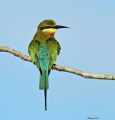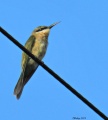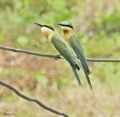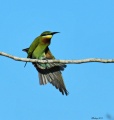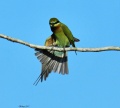LOG IN. UPLOAD PICTURES.
The Philippines has Zambo Mart to help propagate the Chavacano Language.
Difference between revisions of "Category:Blue-tailed bee-eater"
| Line 14: | Line 14: | ||
These bee-eaters are gregarious, nesting colonially in sandy banks or open flat areas. They make a relatively long tunnel in which the 5 to 7 spherical white eggs are laid. Both the male and the female take care of the eggs. These birds also feed and roost communally. The call is similar to that of the European bee-eater. | These bee-eaters are gregarious, nesting colonially in sandy banks or open flat areas. They make a relatively long tunnel in which the 5 to 7 spherical white eggs are laid. Both the male and the female take care of the eggs. These birds also feed and roost communally. The call is similar to that of the European bee-eater. | ||
::''Article copied verbatim from wikipedia'' | ::''Article copied verbatim from wikipedia'' | ||
::Back to Category of [[:Category: Birds | ::Back to Category of [[:Category:Birds|'''Birds''']] | ||
*Pictures by: Rolando Enriquez Inclan | *Pictures by: Rolando Enriquez Inclan | ||
Latest revision as of 05:54, 30 March 2015
- Do the following so your photo upload will be properly categorized for "Blue-tailed bee-eater".
- Copy and paste the code below in "GREEN" to the body or "Summary" of the image file that you are uploading.
[[Category:Blue-tailed bee-eater]]
The blue-tailed bee-eater (Merops philippinus) is a near passerine bird in the bee-eater family Meropidae. It breeds in southeastern Asia. It is strongly migratory, seen seasonally in much of peninsular India.
This species, like other bee-eaters, is a richly coloured, slender bird. It is predominantly green; its face has a narrow blue patch with a black eye stripe, and a yellow and brown throat; the tail is blue and the beak is black. It can reach a length of 23–26 cm, including the two elongated central tail feathers. Sexes are alike.
Blue-tailed bee-eater displaying the blue on the tail and rump while perching This is a bird which breeds in sub-tropical open country, such as farmland, parks or ricefields. It is most often seen near large waterbodies. Like other bee-eaters it predominantly eats insects, especially bees, wasps and hornets, which are caught in the air by sorties from an open perch.This species probably takes bees and dragonflies in roughly equal numbers. The insect that are caught are beaten on the perch to kill and break the exoskeleton. This habit is seen in many other members of the coraciiformes order.
These bee-eaters are gregarious, nesting colonially in sandy banks or open flat areas. They make a relatively long tunnel in which the 5 to 7 spherical white eggs are laid. Both the male and the female take care of the eggs. These birds also feed and roost communally. The call is similar to that of the European bee-eater.
- Article copied verbatim from wikipedia
- Back to Category of Birds
- Pictures by: Rolando Enriquez Inclan
Media in category "Blue-tailed bee-eater"
The following 14 files are in this category, out of 14 total.
- Blue-tailed bee-eater 1.jpg 800 × 600; 51 KB
- Blue-tailed bee-eater 10.jpg 800 × 600; 33 KB
- Blue-tailed bee-eater 11.jpg 800 × 600; 27 KB
- Blue-tailed bee-eater 13.jpg 843 × 883; 56 KB
- Blue-tailed bee-eater 14.jpg 720 × 797; 55 KB
- Blue-tailed bee-eater 16.jpg 843 × 821; 132 KB
- Blue-tailed bee-eater 2.jpg 800 × 600; 56 KB
- Blue-tailed bee-eater 3.jpg 800 × 600; 27 KB
- Blue-tailed bee-eater 4.jpg 800 × 600; 27 KB
- Blue-tailed bee-eater 5.jpg 843 × 884; 63 KB
- Blue-tailed bee-eater 6.jpg 800 × 720; 69 KB
- Blue-tailed bee-eater 7.jpg 800 × 600; 37 KB
- Blue-tailed bee-eater 8.jpg 800 × 600; 53 KB
- Blue-tailed bee-eater 9.jpg 800 × 600; 51 KB



